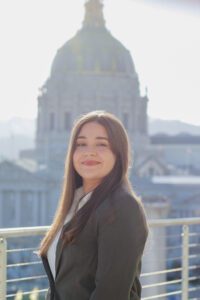Helping Opposing Parties Find Common Ground in Real Cases Prepares 3L Dorsa Gohardoust for a Future in Civil Defense Litigation

Third-year law student Dorsa Gohardoust applied conflict resolution strategies to mediate favorable outcomes for clients at the San Francisco and San Mateo County superior courts.
3L student Dorsa Gohardoust reflects on her experience in the Mediation Clinic, where students help resolve real disputes at local courts and agencies while honing essential lawyering skills.
- Gained experience working to resolve disputes between opposing parties through the UC Law SF Mediation Clinic.
- Learned to anticipate opposing parties’ desires and understand different perspectives, including how cultural backgrounds and personal values influence decision making.
- Strengthened her confidence and ability to remain composed in high-stress situations while practicing skills crucial for a career in litigation.
3L Dorsa Gohardoust:
In the Mediation Clinic, I worked to resolve real-life cases involving auto accidents, landlord-tenant issues, small-business conflicts, and family disputes at the San Francisco and San Mateo County superior courts.
I like mediation because it increases the chances of a favorable outcome for both parties, unlike litigation judgments, which often result in clear winners and losers. Mediation helps parties delve into and uncover the root of the issue, instead of getting bogged down in legalities. If successful, it can also reduce future litigation and conflicts involving the same parties.
As someone interested in a career in civil defense litigation, mediation quickly became an essential skill to me. Most cases get resolved through pretrial negotiations. This clinic trained me to put myself in the other side’s shoes and anticipate their demands. It also taught me how culture and demographics can shape a party’s perspective and how core beliefs and values can lead them to act against their own interests. Lastly, I learned in the mediation clinic to be comfortable with the uncomfortable and how to maintain a neutral face, despite my internal feelings.
This clinic helped me build confidence in my own ability and lawyering skills. It also prepared me to deal with clients who are difficult. I learned to remain poised and professional when dealing with confrontational people and stressful scenarios.
Before entering the field, I learned and practiced techniques and strategies with fellow clinic students. We covered everything from basic issues, such as who speaks first, to more substantive skills, such as identifying cases that are ripe for mediation and effective questions to ask each party. We discussed our challenges and victories as a class, learning from our shared experiences.
My favorite UC Law SF memory is our meditation classes, especially when we did case rounds, where clinic students shared their experiences from working in the field. It was always fun and reassuring to hear about each other’s challenges and feelings. It made us more aware of the humanity in law and how, despite the restrictiveness of law, people can be flexible. That’s what makes the practice of law both challenging and interesting.
The Evidence of Success series highlights UC Law SF students as they share how the college’s opportunities equip them with the experience, skills, and confidence to excel in the legal profession.